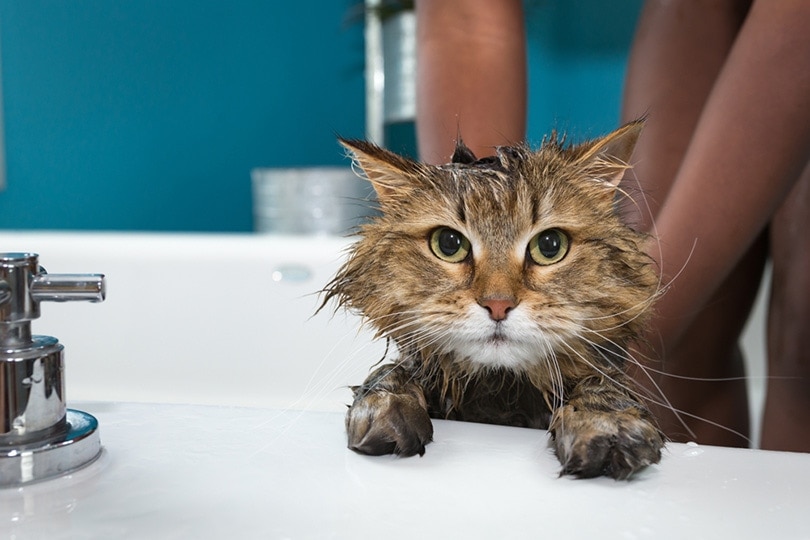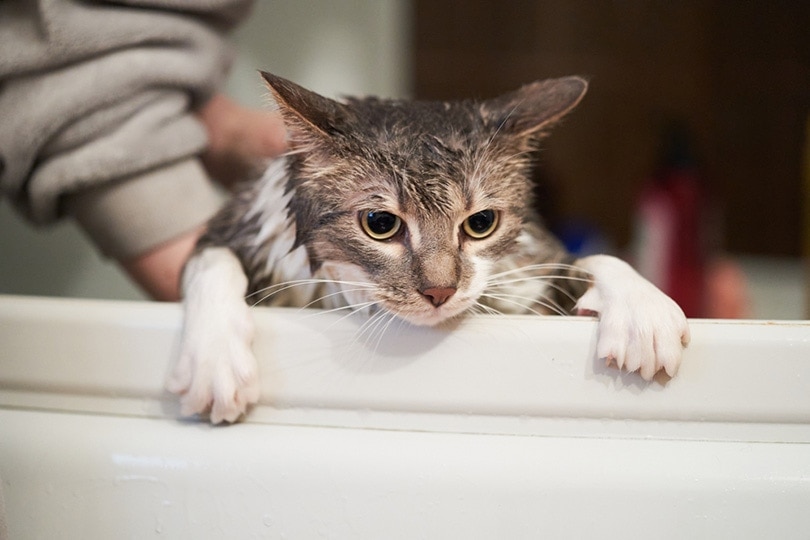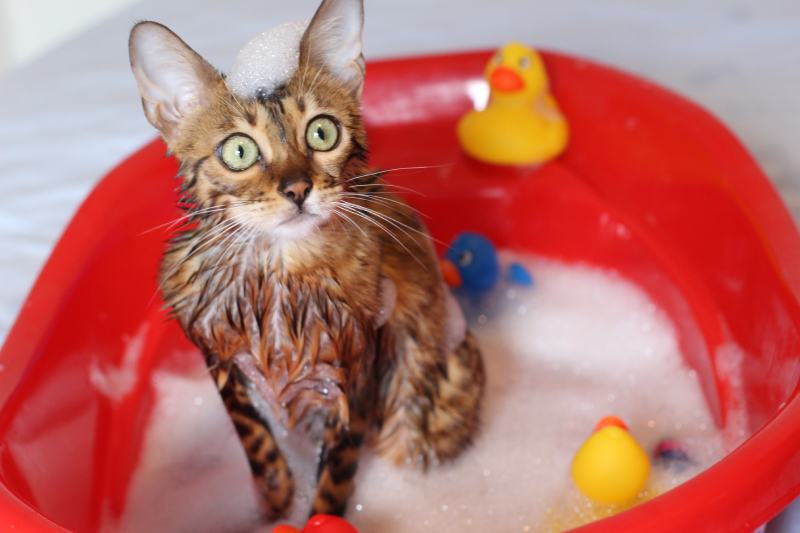Can You Use Human Shampoo on Cats? Vet-Reviewed Safety Facts
Updated on

If you’re like most cat owners, you want to do all you can to keep your feline family members safe, happy, and healthy throughout their lives. Cats are very clean animals who groom themselves meticulously however on occasion, they may need a helping hand when they get extra messy. If you are in a situation where you need to bathe your cat, you want to use a shampoo that will be safe for their skin.
So, can we use human shampoo on cats, even if it is deemed all-natural? The short answer is no, human shampoo should never be used on your cat. It may be effective when it comes to cleaning your cat’s fur, but it can be unbeneficial in many ways that make cleaning effectiveness irrelevant. Here’s what you should know about using human shampoo on cats and alternatives to consider investing your time and money.
Why You Shouldn’t Use Human Shampoo on Your Cat
Even human shampoo that’s promoted as all-natural and made with all plant-based ingredients is not formulated for use on cats. Such products have not been tested on cats. Therefore, you can’t know what reaction your kitty will have after being exposed. In addition, human shampoos are made for the pH balance of a typical human’s body, not a cat’s body.
That said, studies show no big difference in pH levels between pet and human shampoos. Some pet shampoos seem to have pH balances well outside of a cat’s natural pH balance. However, pet shampoos are typically made with ingredients that are safe for pets, while human shampoos do not have to consider the safety of pets during their formulation and testing.
Sulfates and artificial fragrances are a couple of things found in human shampoo that can be toxic to cats. They can sometimes be found in pet shampoos too.
It is always important to read the label of any pet shampoo that you are considering using on your kitty before the first time you use it. If possible, take a picture of the ingredients label and send it to your veterinarian to get their expert feedback and advice. Another reason to avoid human shampoo when bathing your cat is to avoid the risk of drying out their skin and hair. Human (and some pet) shampoos strip natural oils in the cat’s skin that help maintain healthy coats.

Keeping your pet's skin and coat clean and healthy is very important, but finding a great shampoo can be harder than the actual grooming! We love our Hepper Pet Shampoos because they makes grooming so much easier. These pH-balanced formulas are made with natural ingredients like oatmeal, cucumber, and aloe. They are free of phthalates, sulfates, and soaps and very gentle on your pet's skin. Now you just need to decide which formula is best for your fur baby! Here’s a quick guide to help you choose the right option for your pet’s next bath!
 Hepper Colloidal Oatmeal Pet Shampoo |
 Hepper Waterless No Rinse Pet Shampoo |
|
|---|---|---|
| Natural cucumber & aloe scent |
Natural cucumber & aloe scent:
|
Natural cucumber & aloe scent:
|
| Safe for cats & dogs |
Safe for cats & dogs:
|
Safe for cats & dogs:
|
| Rinsing required |
Rinsing required:
|
Rinsing required:
|
| Free of harsh chemicals & nasty ingredients |
Free of harsh chemicals & nasty ingredients:
|
Free of harsh chemicals & nasty ingredients:
|
| Lathers easily |
Lathers easily:
|
Lathers easily:
|
Alternatives to Human Shampoo for Cats
If you feel like you must utilize human shampoo when bathing your kitty, it is important to take a look at the ingredients list and consult your veterinarian to make a final product investment decision. However, it is important to keep in mind that most cats do not need baths.
They’re perfectly capable of grooming themselves as time goes on. If anything, they might need help with their ears and their claws, but they should be able to handle all other aspects of grooming without being dumped into a big tub of water. The more you bathe your cat, the more dried out their skin and brittle their hair is likely to become.
Allowing your cat’s bodily oils and natural cleaning mechanisms to do their jobs should be all that it takes to keep your cat clean and healthy throughout their lives. Spot-bathing is an option if your cat happens to get exceptionally dirty. Just dampen a clean cloth, and use it to clean your cat where necessary. Light, slow rubbing should get the job done. It will be a win-win for your cat — they’ll get cleaner and enjoy a massage at the same time!

Final Thoughts
While human shampoo should not be used when cleaning your cat in a bath, there are many alternatives to consider, ones that will provide you with the cleaning effects that you are looking for. Some may even help soothe or support the health of your kitty’s coat and skin. Try different cleaning methods until you find one that is perfect for you and your feline family member. You might find that your cat needs no bathing at all and can take care of most of their grooming needs.
Featured Image Credit: Marie-Claude Lemay, Shutterstock












